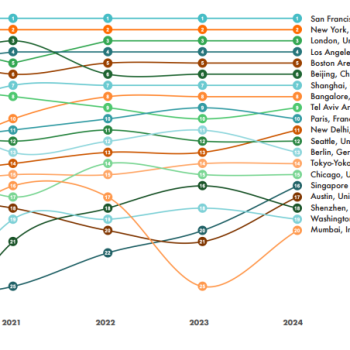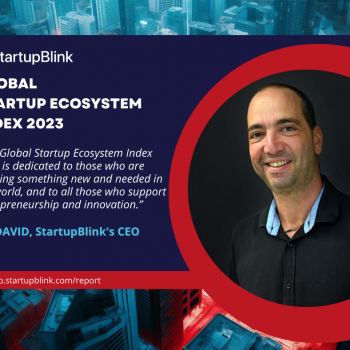The startup ecosystem can only thrive when its players are working hand in hand. Even though both the public and private sectors can make a substantial impact, there are certain steps that only the public or private sector can take to improve the startup ecosystem and make it a better place for entrepreneurs and startup founders.
In this article, we will discuss what startup ecosystem players can do to improve their environment, while at the same time we will present two StartupBlink programs designed for raising awareness about your local startup ecosystem: The City Partnership for private sector organizations and Ecosystem Partnership for the public sector.
Public sector
Infrastructure
Startup ecosystem formation should always begin from public sector involvement. None of the ecosystems exist without a solid base, namely infrastructure, and this is the first step that public sector entities should focus on. Such infrastructures and facilities, like convenient transportation, internet connection, and power supplies, to name the least, are necessary for smooth operation within the startup ecosystem. By fully eliminating any drawbacks it may have, startups acquire the necessary tools to execute their full potential.
Ease legislation
Secondly, entrepreneurs drew to the startup ecosystems that allow their players to function without unnecessary obstacles. Consequently, assistance and support from the public sector should be the first thing on the to-do list. Let’s be honest, no founder wants to spend hours stepping in and out of the legal institutions without a clear purpose. Signing hundreds of documents or having to wait months to finally have their young business registered does not sound exciting. Therefore, it is important to check first whether there are any pitfalls that need removing. Ensure that the process and the legalities are simple and the ecosystem is receiving well-deserved interest and has a positive perception.
Track your startup ecosystem development
The ability to track the status and current momentum is essential when developing your startup ecosystem (“The Importance of Startup Ecosystem Mapping”). By far, mapping is one of the best solutions to be aware of activities, projects, founders, events, and much more within the ecosystem. This shared knowledgebase tool allows following trends, improvements, and obstacles. Hence, it also provides a stable base for creating strategies and making data-driven decisions to scale the startup ecosystem.
At the same time, knowing your own startup ecosystem is not enough because much more is happening outside of it. By comparing and cooperating, you can create truly amazing connections. At StartupBlink, we have created a Startup Ecosystem Rankings Report that allows you to compare your startup ecosystem to others. This report also allows you to see the situation regionally, nationally, and globally. By using this tool, public sector organizations can be effective in forming strategies that would fit their ecosystem needs.
Promote your ecosystem
In order to raise awareness of the local startup ecosystem, public sector entities, such as governments and municipalities, should dedicate resources to promote their ecosystem and spread the word about their activities, players, and victories. As this is a very wide topic by itself, we have written a blog post about the tools to boost your startup ecosystem visibility and exposure to the community of thousands.
From years of experience working with dozens of governments and municipalities, we have noticed how much depends on setting and promoting ecosystems correctly. Startup ecosystems are a lot about perception. Consequently, if the ecosystem is a positive place filled with opportunities, more people, investors, and even corporations want to be there. At StartupBlink, we have created the Ecosystem Partnership for the public sector only. This program aims to promote and map startup ecosystems. We are offering a variety of valuable tools to improve the understanding of your ecosystem. So, entrepreneurs and people outside of your ecosystem are aware of current activities and triumphs. We are looking forward to seeing you join us as an Ecosystem Partner and work together with us in promoting your startup ecosystem.
The moment a startup ecosystem catches momentum, public sector activities take a support role. This is the time when the private sector, entrepreneurs, startup founders, and investors come into the picture.
Private sector
Make connections
The private sector can improve the startup ecosystem by focusing on its connector’s role. As mentioned before, a lot of startup ecosystem strength lays in the perception that is created by the community itself. The more connected it is, the more robust your startup ecosystem will be perceived. Hence, it is important to have an active leader from the private sector to connect different players. Private sector organizations should show interest in the local projects and get to know all the people within an ecosystem. And then, by using this network resource, they can easily connect relevant people and projects with one another.
Organize events
The private sector can also unite players by holding, facilitating, and participating in the events for the community. Be that a work session or a regular get-together for entrepreneurs, these are the times where most magic inside the startup ecosystem happens by solving day-to-day problems and finding solutions for individual and communal growth. And most importantly, the startup ecosystem becomes a buzzing environment that everyone wants to take part in.
Open a coworking space or accelerator program
Coworking spaces and accelerator programs work great when a startup ecosystem needs a boost! They not only provide a place for entrepreneurs to work but also serve as a space to interact. When opening a coworking space or accelerator program, the private sector should consider joining forces with public institutions. This way the whole process will go smoother and you will have a backup. In the end, everyone benefits from a strong startup ecosystem.
Branding
Even though the promotion of startup ecosystems is usually the public sector’s responsibility, the private sector can add its part as well by branding itself as the leader of an ecosystem. The City Partnership program is for individuals and projects that aim to connect with startup founders and public sector developers locally and globally. By joining us as a City Partner, you will receive an acknowledgment by 75,000+ entrepreneurs and decision-makers on the StartupBlink Global Startup Map, as well as be recognized as our research partner in our widely distributed Startup Ecosystem Reports and admin access to both our startup data and Meetup communities. As the program is exclusive for only one partner per city, cities are being locked constantly. Therefore, if you want to join, wait no more and apply now.
In brief, both the public and private sectors can do plenty of activities to improve their local startup ecosystems. The most important step is to actively participate in the community and build opportunities to meet, interact and create together.









